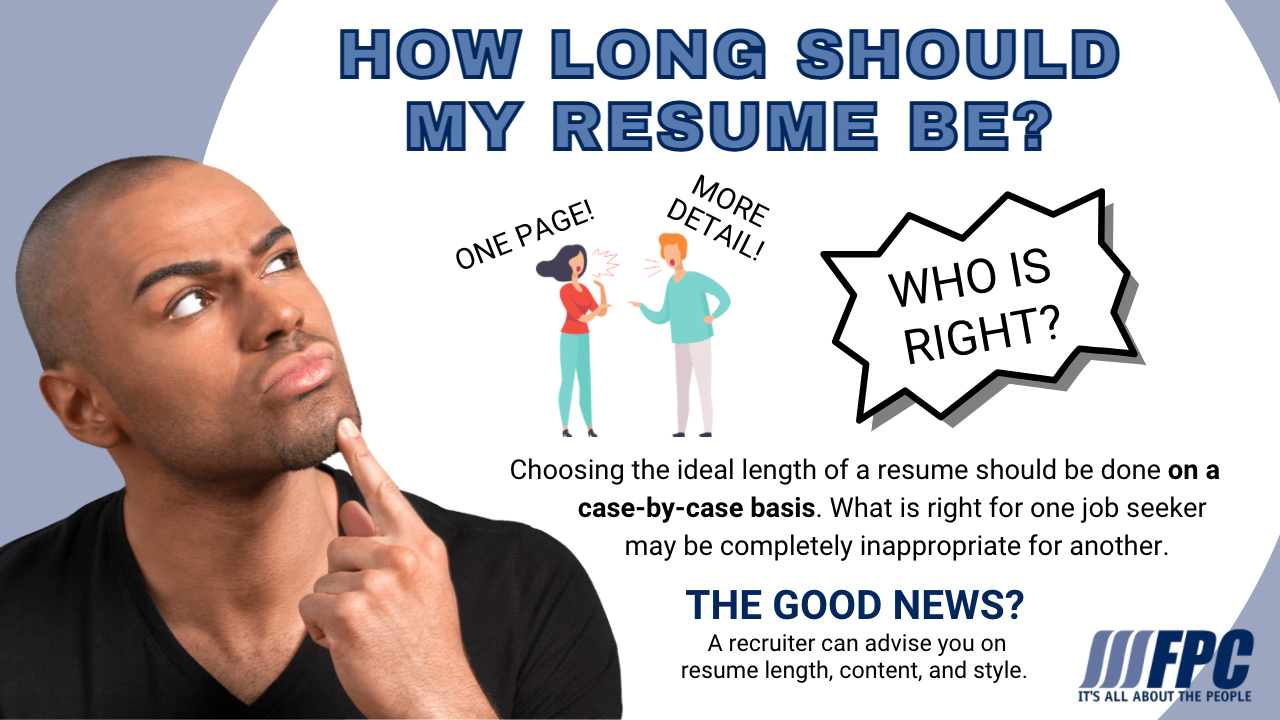How Long Should My Resume Be?
Job Seekers
The ideal resume length is one of the most argued topics in the career-services industry. While some old-school hiring managers insist on the one-page, get-to-the-point format, others prefer more details to help differentiate one job seeker from another.
So, who is right? What is the best length for a resume? Let’s dive in.
The One-Page Resume
The greatest feature of a one-page resume is its brevity. The theory behind the one-page approach is that recruiters and employers receive an overabundance of resumes for each open position, and they do not have the time or desire to read more than one page.
While this perspective is a bit outdated in most cases, there are great benefits to keeping a resume to one page. For example, when working within the confines of a single page, the job seeker is forced to focus exclusively on the most important aspects of their background. There is no room for fluff, secondary achievements, or non-essential listings. The information on a one-page resume is typically more relevant and more impactful than longer versions.
It would be a mistake to think that the one-page resume is easier to compose that multiple pages. The opposite is often the case. The old saying, “If I had more time, I would have written a shorter letter” (attributed to many people) demonstrates the arduous task of whittling down a larger document to just one page.
Often, professors and college career advisors insist that their students keep resumes to one page, and for good reason. When someone is just starting their career, they typically do not have enough quality information to extend beyond one page (although some exceptional students can easily justify a second page). Job seekers often carry this advice with them well into their careers, and they are sometimes reluctant to change their approach, even when they reach mid-career and have many more accomplishments under their belts.
The Two-Page Resume
For many professionals, a two-page resume is the perfect length. This gives the job seeker enough space to demonstrate their value without placing an undue burden on the recruiter or hiring manager. Once a job seeker accumulates several years of experience, it becomes increasingly challenging to effectively communicate their value on a single page.
A second page also allows the job seeker to flex their muscles and convey their worth through storytelling. The additional details surrounding their accomplishments can provide context and show impact. A single, standalone bullet can be vague and leave out a lot of pertinent information.
Additionally, since most resumes are submitted electronically, a second page gives candidates more opportunities to include keywords in their resumes, thereby increasing their chances of being found in search queries.
When determining your resume length, ask yourself if you are able to clearly communicate your worth on one page. If so, that is the ideal length for you. But if not, consider going to the second page to tell a more complete story.
The Three-Page Resume
Is it ever okay to submit a three-page resume? I suggest you apply the same criteria as you did when deciding if a second page is right for you. Do you really need three pages to tell your story? If so, this may be the best length for you. Leaving off critical information that supports your candidacy can actually be more detrimental than submitting a lengthy resume. Also, some senior executives and certain fields tend to use longer resumes, including those who need to provide leadership competencies, lengthier explanations, detailed lists of training, and technical qualifications.
Bottom Line
Choosing the ideal length of a resume should be done on a case-by-case basis. What is right for one job seeker may be completely inappropriate for another. The good news is that when working with a recruiter, they can advise you on resume length, content, and style. For more than 60 years, the professional recruiters at FPC have been guiding job seekers at all levels to achieve career success. Reach out to your local FPC office today and get started on landing your ideal job.

